英汉对比与翻译
- 格式:doc
- 大小:44.00 KB
- 文档页数:5
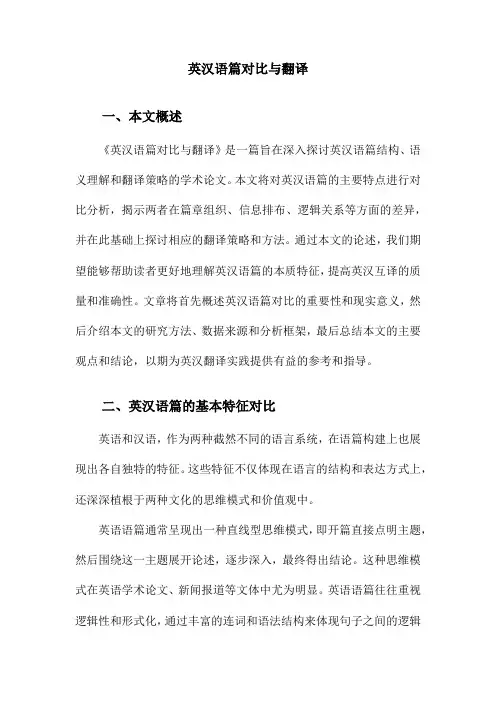
英汉语篇对比与翻译一、本文概述《英汉语篇对比与翻译》是一篇旨在深入探讨英汉语篇结构、语义理解和翻译策略的学术论文。
本文将对英汉语篇的主要特点进行对比分析,揭示两者在篇章组织、信息排布、逻辑关系等方面的差异,并在此基础上探讨相应的翻译策略和方法。
通过本文的论述,我们期望能够帮助读者更好地理解英汉语篇的本质特征,提高英汉互译的质量和准确性。
文章将首先概述英汉语篇对比的重要性和现实意义,然后介绍本文的研究方法、数据来源和分析框架,最后总结本文的主要观点和结论,以期为英汉翻译实践提供有益的参考和指导。
二、英汉语篇的基本特征对比英语和汉语,作为两种截然不同的语言系统,在语篇构建上也展现出各自独特的特征。
这些特征不仅体现在语言的结构和表达方式上,还深深植根于两种文化的思维模式和价值观中。
英语语篇通常呈现出一种直线型思维模式,即开篇直接点明主题,然后围绕这一主题展开论述,逐步深入,最终得出结论。
这种思维模式在英语学术论文、新闻报道等文体中尤为明显。
英语语篇往往重视逻辑性和形式化,通过丰富的连词和语法结构来体现句子之间的逻辑关系,使整个篇章结构紧凑、层次分明。
相比之下,汉语语篇则更多地采用螺旋型思维模式。
在汉语表达中,作者往往先从外围入手,通过描绘背景、渲染气氛等方式逐渐引出主题。
这种思维模式在汉语文学作品、日常会话中尤为常见。
同时,汉语语篇更注重意合性,即通过语境和语义的关联来实现句子之间的衔接和连贯,而非依赖明显的连词或语法结构。
造成这种差异的原因在于英汉两种文化的不同。
英语文化强调逻辑性和客观性,注重分析和推理,因此英语语篇也呈现出一种客观、直接的风格。
而汉语文化则更注重整体性和和谐性,强调综合和感悟,因此汉语语篇更倾向于采用一种委婉、含蓄的表达方式。
了解英汉语篇的这些基本特征差异,对于提高英汉互译的质量具有重要意义。
在翻译过程中,译者需要充分考虑到两种语言在语篇构建上的不同特点,灵活运用各种翻译技巧和方法,以实现原文与译文在语义、风格和文化内涵上的对等。
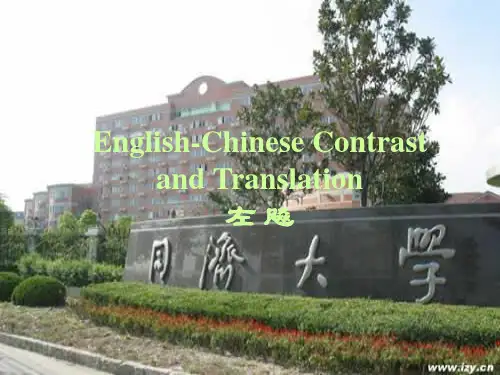
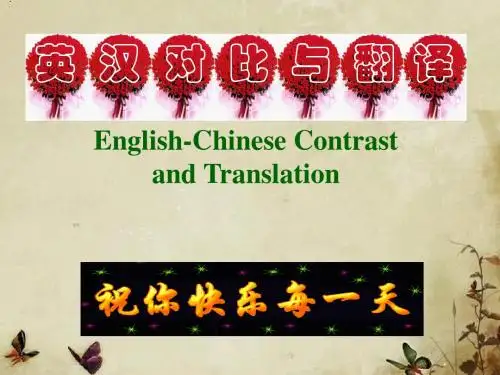
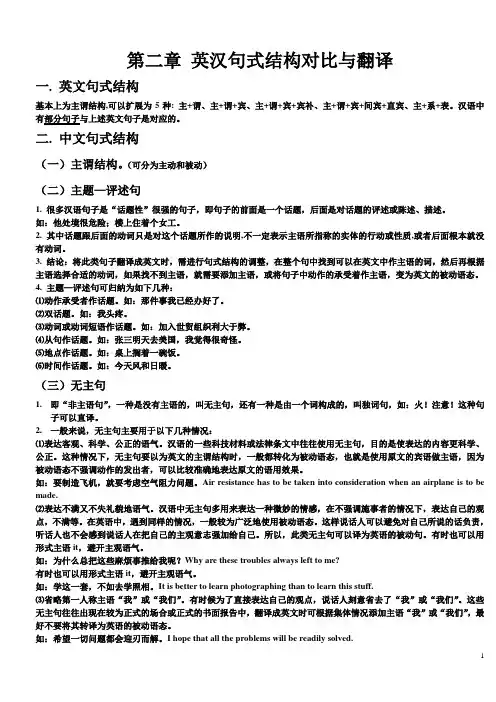
第二章英汉句式结构对比与翻译一. 英文句式结构基本上为主谓结构,可以扩展为5种: 主+谓、主+谓+宾、主+谓+宾+宾补、主+谓+宾+间宾+直宾、主+系+表。
汉语中有部分句子与上述英文句子是对应的。
二. 中文句式结构(一)主谓结构。
(可分为主动和被动)(二)主题—评述句1. 很多汉语句子是“话题性”很强的句子,即句子的前面是一个话题,后面是对话题的评述或陈述、描述。
如:他处境很危险;楼上住着个女工。
2. 其中话题跟后面的动词只是对这个话题所作的说明,不一定表示主语所指称的实体的行动或性质,或者后面根本就没有动词。
3. 结论:将此类句子翻译成英文时,需进行句式结构的调整,在整个句中找到可以在英文中作主语的词,然后再根据主语选择合适的动词,如果找不到主语,就需要添加主语,或将句子中动作的承受着作主语,变为英文的被动语态。
4. 主题—评述句可归纳为如下几种:⑴动作承受者作话题。
如:那件事我已经办好了。
⑵双话题。
如:我头疼。
⑶动词或动词短语作话题。
如:加入世贸组织利大于弊。
⑷从句作话题。
如:张三明天去美国,我觉得很奇怪。
⑸地点作话题。
如:桌上搁着一碗饭。
⑹时间作话题。
如:今天风和日暖。
(三)无主句1.即“非主语句”,一种是没有主语的,叫无主句,还有一种是由一个词构成的,叫独词句,如:火!注意!这种句子可以直译。
2.一般来说,无主句主要用于以下几种情况:⑴表达客观、科学、公正的语气。
汉语的一些科技材料或法律条文中往往使用无主句,目的是使表达的内容更科学、公正。
这种情况下,无主句要以为英文的主谓结构时,一般都转化为被动语态,也就是使用原文的宾语做主语,因为被动语态不强调动作的发出者,可以比较准确地表达原文的语用效果。
如:要制造飞机,就要考虑空气阻力问题。
Air resistance has to be taken into consideration when an airplane is to be made.⑵表达不满又不失礼貌地语气。
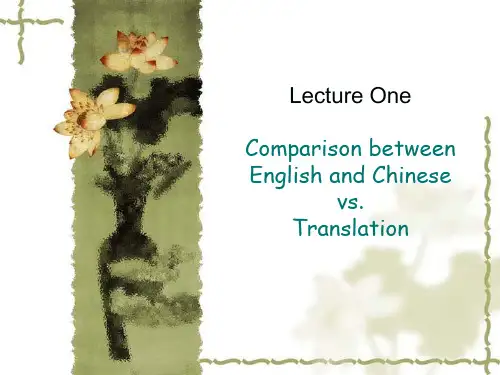
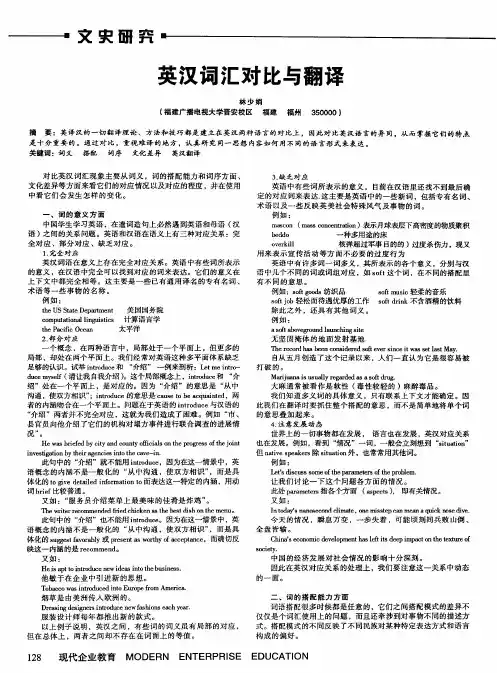
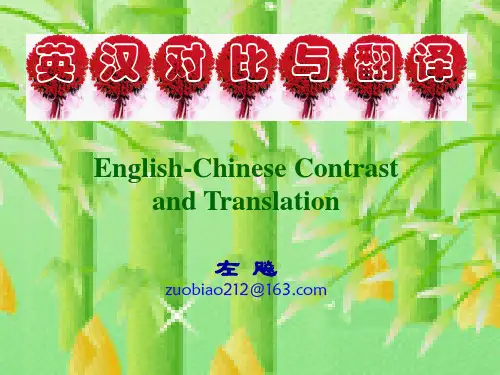
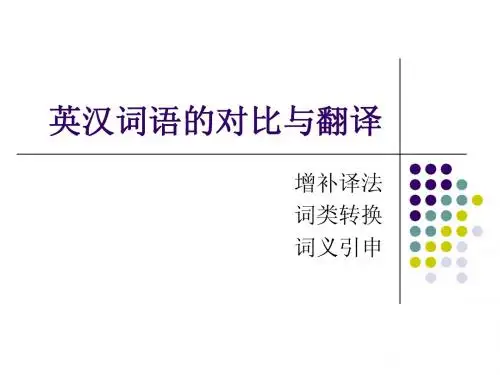
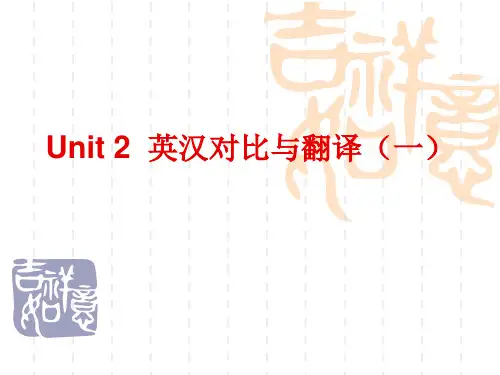
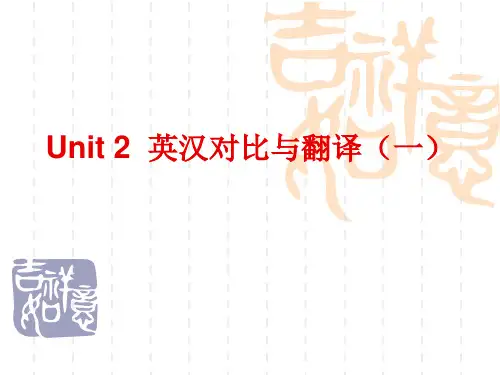
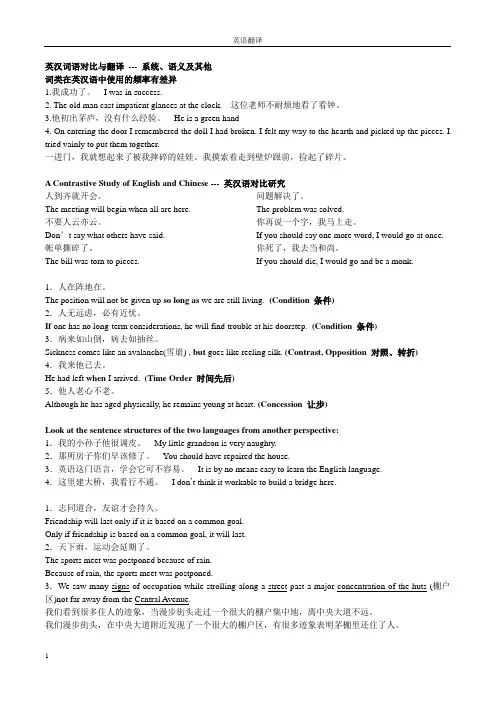
英汉词语对比与翻译--- 系统、语义及其他词类在英汉语中使用的频率有差异1.我成功了。
I was in success.2. The old man cast impatient glances at the clock. 这位老师不耐烦地看了看钟。
3.他初出茅庐,没有什么经验。
He is a green hand4. On entering the door I remembered the doll I had broken. I felt my way to the hearth and picked up the pieces. I tried vainly to put them together.一进门,我就想起来了被我摔碎的娃娃。
我摸索着走到壁炉跟前,捡起了碎片。
A Contrastive Study of English and Chinese --- 英汉语对比研究人到齐就开会。
The meeting will begin when all are here. 不要人云亦云。
Don’t say what others have said.帐单撕碎了。
The bill was torn to pieces. 问题解决了。
The problem was solved.你再说一个字,我马上走。
If you should say one more word, I would go at once. 你死了,我去当和尚。
If you should die, I would go and be a monk.1.人在阵地在。
The position will not be given up so long as we are still living.(Condition 条件)2.人无远虑,必有近忧。
If one has no long-term considerations, he will find trouble at his doorstep.(Condition 条件)3.病来如山倒,病去如抽丝。
浅谈英汉对比与翻译众所周知,要想学好外语,对其特点的了解是必须的,而要了解其特点,最好的方法就是与母语加以比较。
语言对比分析对学好翻译尤其重要,本文主要从词义对比、语境、定语位置等方面谈谈个人学习过程中的体会。
标签:词义对比;语境;定语如果对英语基础知识的储备很少,基本的语法结构也说不清楚,仅凭着对英语的热爱是绝对走不远的。
我平时遇到的很大的问题就是英汉词语一一对应的“怪圈”,翻译时定语的位置很模糊,害怕长句。
1.英汉词义对比与翻译中的选词要完全跳出一个英文单词对应一个中文意思的怪圈,不同的语境下词汇的意思会差很多。
语境决定词的涵义。
英语单词play的搭配很广,但是在翻译成汉语时,要考虑搭配习惯。
比如play basketball要译成“打篮球”,而play football要译成“踢足球”,play a joke要译成“开玩笑”等。
因母语为汉语,所以在英译汉时大脑的惯性思维会使我较轻松地搭配好动宾关系,而汉译英时总会遇到选词不当的情况。
比如“送货上门”应译成deliver the good to the door,“送你去机场”要译成drive you to the airport。
例子:(1)新来的老师还嫩了点。
(2)这黄瓜很嫩。
第一个句子,本身的意思来看,“嫩”除了表示“年轻”外,还隐含“经验不足”。
故书中给出的参考译文是:The new teacher is young and inexperience.第二个句子,应该是“新鲜、幼嫩”,译文:The cucumber is quite fresh and tender.语境决定词义的广狭。
如“农业”,广义和狭义的分别为agriculture和farming;“语言”,分别为language和dialect;“人”,分别为man和men。
语境还决定词的感情色彩。
如nazi leadership译为:纳粹头子。
文化语境的差异对词的选择也有很大影响。
华 中 师 范 大 学 本 科 生 课 程 论 文论文题目 English-Chinese Contrast and Translation完成时间 2013.05.31课程名称 英汉对比与翻译专 业 辅修第二学位英语专业年 级 2010英语第二学位辅修本科生注:本科生须在规定期限内完成课程论文,并用A4页面打印,加此封面装订成册后,送交评审教师。
教师应及时评定成绩,并至迟在下学期开学后两周内将此课程论文及成绩报告单一并交本单位本科生教学秘书存档。
姓 名 郭培斌 学 号 2010210596成 绩 评卷人English-Chinese Contrast and TranslationI. IntroductionI have learned the “Comparison of English and Translation:An Introduction ” for a semester and I would like to talk about some of my own understanding of this course here .II. Native Language Transfer in first language learning : Interference or Facilitation ?Some people may ask what is language transfer . Transfer is the influence resulting from the similarities and differences between the target language and any other language that has been previously acquired . (Od-lin , 1989 : 27 )We could divided translate into two part : Negative Transfer and Positive Transfer .By awareness of the similarities and differences between the two languages can facilitate first language learning .2.1 Negative TransferTo sum up , there are probably three causes would form negative transfer . Firstly , analogical use of one’s prior knowledge of the mother tongue makes us study Chinese-style English easier . Secondly , Confusion comes from scanty knowledge of differences between the two languages . Thirdly , we always unconscious falling back on the mother tongue since customary .For a few example :2.1.1 The writer likes writing at light (night) .The sound /n/ does not exist in some Chinese dialects and /l/ serves as a substitute .2.1.2 He only eat two meal a day .Neither nouns nor verbs have inflections in Chinese .2.1.3 Shanghai is said to have thirteen million population .The noun renkou , the Chinese equivalent of “population ”can have a numerical pre-modifier .2.1 4 He suggested me to accept this offer .The verb jianyi , the Chinese equivalent of “suggest ” can be used in VOC pattern in Chinese .2.1.5 --Your English is wonderful .--No , no . My English is still poor .The negative reply to a compliment is considered in Chinese as modest and courteous .We could turn negative transfer into positive by making analysis on differences between the two languages and arouse the learner’s awareness of avoiding or reducing errors from analogy .III. Contrast and Translation : Enlightenment on translation from the contrastbetween the two languages3.1 Contrast between English and Chinese3.1.1 difference 1English : Impersonal Chinese : Personal1. Astonishment and even horror oppressed him .他感到惊讶甚至恐惧。
2. Excitement deprived me of all power of utterance .我兴奋得什么话都说不出来。
3. The sight of the big tree always reminds me of my childhood .我一看到那课大树就想起了童年的情景。
3.1.2 difference 2English : Passive Chinese : Active1. They are paid for this .他们拿钱就是干这事的。
2. The difficulties have been overcome , and the problem solved .苦难克服了,问题就解决了。
3. Table tennis is played all over China .打兵乓球风靡中国。
4. Why should all these unpleasant jobs be pushed on to me ?为什么总要把这些麻烦事退给我?3.1.3 difference 3English : Static Chinese : Dynamic1. She is the best hater I’ve ever known .我所认识的人中数她最会记仇。
2. There is a crying need tor a new remedy .现在急需想出新法子来补救。
3. It was only my capacity for hard word that saved me from early dismissal .要不是我能干重活,早就给辞退了。
3.1.4 difference 4English : Complex Chinese :Simple1. It is advised that the man who was seen to take an umbrella from the lecture theatre last Sunday put it back if he does not wish to get into trouble .上星期傍晚,有人看到某人在演讲厅取走雨伞一把,取伞者如不愿卷入纠纷,还是将伞放回原处为好。
2. The image of the rolling water carrying the man and his car away in an instant is still imprinted on my mind .顷刻之间,滚滚的浊水连人带车一股脑儿都给冲走了。
这情景,直到现在还印在我的脑海里。
3.1.5 difference 5English : Abstract Chinese : Concrete1. He was impressed by Deng Xiaoping’s flexibility .他对邓小平的灵活态度印象深刻。
2. Their eccentricity often makes you frown .他们的古怪行为常常令人皱眉。
3. We stepped onto the mysterious land with caution and uneasiness .我们怀着谨慎和不安的心情踏上了那片神秘的国土。
3.1.6 difference 6English : Hypotactic Chinese : Paratactic1. If you don’t cmpare , you’re in the dark , but the moment you do ,you get a shock .不比不知道,一比吓一跳。
2. The onlooker sees most of the game .当局者迷,旁观者清。
3 In calamity , one sees the true friendship .疾风知劲草,患难见真情。
3.1.7 difference 7English :plain and factual Chinese :rhythmic and symmetrical1. He is a smart , dloquent , upright and well-informed lawyer .他是一个律师,脑子灵,口才好,为人正直,见多识广。
2. She was an intelligent ,attractive and somewhat temperamental daughter of a well-to-do doctor .她聪明、漂亮、爱耍点小脾气,是一个家道小康的医生的女儿。